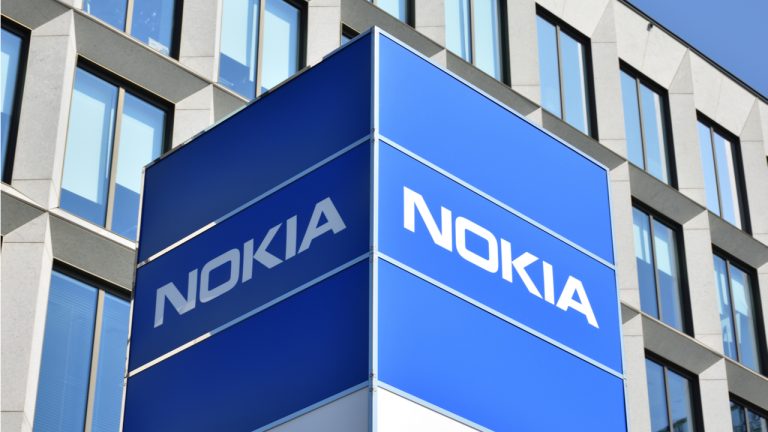
A Nokia patent application shows that the company may be moving into digital asset encryption.
Finnish telecom company Nokia filed for a patent on a “device, method and computer program” that can encrypt digital assets.
On Dec. 23, the China National Intellectual Property Administration (CNIPA), patent office of the People’s Republic of China, disclosed that Nokia Technologies had applied for the digital asset encryption patent.
According to English translations of the application, the patent is for a device and a program with a component that encrypts digital assets.
Translation of filing CN 119155674 A by Nokia Technologies. Source: CNIPA

Once known as a manufacturer of hardy mobile phones, Nokia has been working on developing industrial use cases for the Metaverse.
From beer breweries on opposite ends of the globe to aircraft technicians in isolated airports, telecoms infrastructure firm Nokia has been looking for ways to use the Metaverse to aid remotely-located workers.
Nokia, who many remember as a manufacturer of consumer mobile devices, has since pivoted into developing technology and equipment that “delivers the internet.”
Robert Joyce, CTO of Nokia Oceania told Cointelegraph that part of those plans also includes delivering the Metaverse.
“Nokia set up two labs last year to really look at the Metaverse and the technologies that underpin the Metaverse.”
Last year, Nokia began collaborating with an Australian university to deliver a 5G-connected microbrewery using metaverse technology, noted Joyce.
Using Augmented Reality (AR), researchers from a brewery tech lab at the University of Technology Sydney have been working alongside researchers from a twin facility at Dortmund University in Germany.

“They actually do joint experiments where they brew beer, they change the process, the temperature, the timings, the volumes, the recipes [...] and they feed back all of that brewing process into the digital twin,” he explained.
“Then they can actually simulate brewing in the digital twin so they can perfect the beer in the digital space."
Meanwhile, in South Australia, Joyce said Nokia has been using the metaverse to potentially assist Cessna aircraft technicians at remote airports.
“We worked with a company that had a virtual Cessna aircraft [...] You’ve got a Cessna in front of you, and then you have an audio instruction in your ear to tell you how to change the wheel, or change a part on the engine," said Joyce.
“We had a 5G connected Microsoft HoloLens and we were able to instruct people on how to service a Cessna using augmented reality in this case.”

Earlier this month, Nokia's global chief strategy and technology officer Nishant Batra told the World Economic Forum (WEF) that the Metaverse will have the biggest immediate impact on industries, rather than the consumer market.
“Ports have begun using digital twins to track every container on their docks, no matter how deeply they are buried in stacks. Aerospace companies are building engines and fuselages in the digital world to simulate exactly how an aircraft will fly – long before they tool its first mechanical part,” wrote Batra in a Jan. 13 WEF op-ed.
The industrial #metaverse promises to fundamentally change the way we work, whilst driving productivity, boosting safety, and enabling new levels of flexibility.
— Nokia (@nokia) January 13, 2023
Find out more ahead of Davos in this blog from Nokia’s Nishant Batra. ▶️ https://t.co/BiDWssGfm0 @wef #WEF23 pic.twitter.com/d6Jfg5mk2G
Joyce agreed with the statement, adding he doesn’t expect the “consumer metaverse” to take off until 2030.
He said by next year there will be five times the revenue spent on the “industrial Metaverse” compared to the consumer or enterprise Metaverse.
“The technology is not there yet, the technology is clunky,” said Joyce, referring to currently available consumer Metaverse devices.
“It's not the best experience to have a Quest 2 on your head for a couple of hours, and it's not until people get to the augmented reality wearables that are comfortable [and] mass-produced.”
“We see this three or five-year lag before we actually see massive uptake in consumer virtual reality or augmented reality services.”
Related: An overview of the metaverse in 2022
Asked how blockchain will play a part in the future of the Metaverse, Joyce was optimistic that the technology will be key when payments or a transfer of assets is involved.
“Clearly if you wanted integrity within a metaverse, then blockchain will play a part,” said Joyce.
“If I was going to buy a house next to Snoop Dogg’s and want to ensure that it couldn’t be lifted and shifted and copied, that's where blockchain is quite useful in terms of maintaining uniqueness in a digital space.”
Joyce however said that he doesn’t believe blockchain is a necessity in all applications.
“It's not an essential underpinning technology for the Metaverse but I'm glad we've got it [...] and it will be used in the Metaverse,” he concluded.
 In this week’s hottest stories from Bitcoin.com News: the Ghanaian cedi’s recent slide to a new low against the USD, Rich Dad Poor Dad author Robert Kiyosaki weighs in on Saudi Arabia’s move to join the BRICS nations, the United States Internal Revenue Service updates tax filing instructions for crypto, and more. Report: Ghanaian Cedi […]
In this week’s hottest stories from Bitcoin.com News: the Ghanaian cedi’s recent slide to a new low against the USD, Rich Dad Poor Dad author Robert Kiyosaki weighs in on Saudi Arabia’s move to join the BRICS nations, the United States Internal Revenue Service updates tax filing instructions for crypto, and more. Report: Ghanaian Cedi […] Nokia, one of the first companies to manufacture a consumer-grade mobile phone system, now believes the metaverse will cause phones to become deprecated. These metaverse experiences will be powered by the use of virtual reality (VR) headsets and augmented reality glasses, and will allow users to interact in several activities. Industrial usage will also be […]
Nokia, one of the first companies to manufacture a consumer-grade mobile phone system, now believes the metaverse will cause phones to become deprecated. These metaverse experiences will be powered by the use of virtual reality (VR) headsets and augmented reality glasses, and will allow users to interact in several activities. Industrial usage will also be […]
Nokia’s permissioned blockchain platform will reportedly allow trusted data exchange and monetization among client participants.
Smartphone maker Nokia has announced the launch Nokia Data Marketplace — the company’s enterprise-grade blockchain-based data marketplace infrastructure service.
In a release issued on Wednesday, Nokia revealed that its new blockchain service reportedly offers data transaction and analysis within the framework of a secure private, permissioned blockchain infrastructure.
As part of the announcement, Nokia declared that clients across diverse industries can participate in the blockchain network, leveraging the benefits of decentralized technology for trusted data transfer.
An excerpt from the release reads:
“This [the Nokia Data Marketplace] enables a wide range of vertical use cases, including electric vehicle charging, environmental data monetization, supply-chain automation and preventative maintenance powering numerous vertical segments, including transportation, ports, energy, smart cities and healthcare.”
As part of the vertical integration potential of its blockchain data marketplace, Nokia also stated that the new service could enable other communication service providers to develop similar networks.
“With Nokia Data Marketplace, enterprises and CSPs can now benefit from richer insights and predictive models to drive digital ways of working and tap into new revenue streams,” added Friedrich Trawoeger, vice president of cloud and cognitive services at Nokia.
Apart from trusted data exchange and monetization, Nokia is also reportedly eyeing the deployment of the new platform toward advances in artificial technology and machine learning via blockchain-based federated learning protocols.
Nokia becomes the latest company to debut a blockchain-based enterprise service as the market sector experienced significant growth in 2020. As previously reported by Cointelegraph, enterprise blockchain has been touted as a major adoption driver for 2021.
This significant growth in the enterprise blockchain arena has also positively impacted the price action of decentralized ledger technology projects that are building solutions in this market segment.
Indeed, enterprise-focused cryptocurrencies like Stellar Lumen (XLM), XinFin Network's XDC, and XRP have experienced upward price movements in recent times.